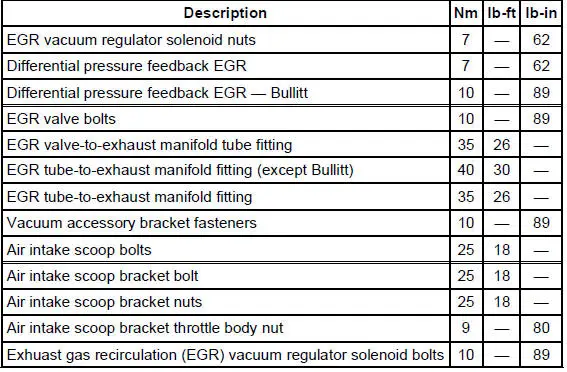Ford Mustang (1999-2004) Service Manual: Engine Emission Control
Torque Specifications

- Engine Emission Control (Description and Operation)
- Exhaust Gas Recirculation (EGR) Valve
- Exhaust Gas Recirculation (EGR) Valve - Cobra
- Exhaust Gas Recirculation (EGR) Valve - Mach I
- Exhaust Manifold to Exhaust Gas Recirculation (EGR) Valve Tube
- Exhaust Manifold to Exhaust Gas Recirculation (EGR) Valve Tube - Cobra
- Exhaust Manifold to Exhaust Gas Recirculation (EGR) Valve Tube - Mach I
- Differential Pressure Feedback Exhaust Gas Recirculation (EGR) System
- Exhaust Gas Recirculation (EGR) Vacuum Regulator Solenoid
- Positive Crankcase Ventilation (PCV) Hose
 Spark Plugs
Spark Plugs
Removal and Installation
1. Remove the ignition coil-on-plug. For additional information, refer to
Ignition Coil-On-Plug in this
section.
2. NOTE: Use compressed air to remove any foreign materi ...
 Engine Emission Control (Description and Operation)
Engine Emission Control (Description and Operation)
CAUTION: Do not remove any part of the engine emission control system.
Operating the
engine without the engine emission control system will reduce fuel economy and
engine
ventilation. This will weak ...
Other materials:
Glass, Frames and Mechanisms (Description and Operation)
Component Location
Windshield Glass
The windshield exterior mouldings are installed with the windshield
glass. The windshield exterior
mouldings cannot be replaced without removal of the windshield.
Window Regulator Control Switch
Power windows ...
Rear Bumper
Removal and Installation
All vehicles
1. Remove the rear bumper cover. For additional information, refer to Rear
Bumper Cover in this
section.
2. Remove the rear bumper cover isolator.
Vehicles with 4.6L engines
3. Remove the bolts and the exhaust outlet pip ...
Safety Belts
PRINCIPLES OF OPERATION
WARNING: Always drive and ride with your seat back upright
and the lap belt snug and low across the hips
WARNING: To reduce the risk of injury, make sure children sit
where they can be properly restrained.
WARNING: Never let a passenger ...
